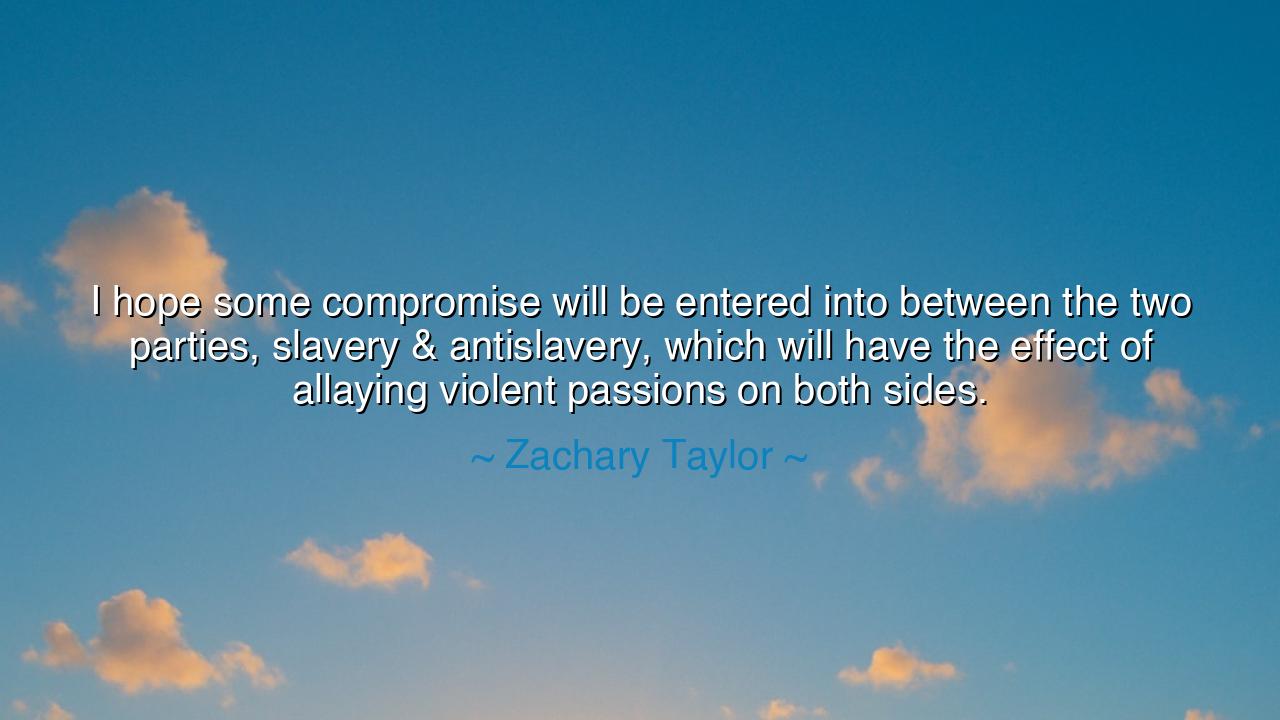
I hope some compromise will be entered into between the two
I hope some compromise will be entered into between the two parties, slavery & antislavery, which will have the effect of allaying violent passions on both sides.






“I hope some compromise will be entered into between the two parties, slavery & antislavery, which will have the effect of allaying violent passions on both sides.” – Zachary Taylor
There are words that stand at the crossroads of history—spoken not in triumph, but in trembling hope. Such were the words of Zachary Taylor, the twelfth President of the United States, uttered in the tense and dangerous years before his nation was torn apart by civil war. His plea for compromise was not born of weakness, but of wisdom. He saw before him a nation divided, its heart split between slavery and antislavery, between the chains of oppression and the cry for freedom. He longed for peace, for reason, for a bridge that might hold the Union together before violent passions swept all away.
In that age, the question of slavery had grown into a roaring fire. The North condemned it as sin; the South defended it as destiny. Between them lay not only political discord, but the deepest moral wound a nation could bear. Taylor, a soldier who had fought bravely for his country, now stood upon the battlefield of conscience. He knew that if men could not find a path of compromise, blood would soon water the very soil they called home. His hope, simple yet profound, was that reason might yet overcome rage, and that the spirit of unity might heal what greed and pride had torn.
But history, like a river swollen with storm, did not heed his prayer. After Taylor’s death in 1850, the fragile balance of his nation continued to crumble. The Compromise of 1850—a desperate attempt to preserve peace—was signed, but it only delayed the inevitable. The passions Taylor sought to calm grew into fury. A decade later, Abraham Lincoln would stand where Taylor once stood, not to plead for peace, but to fight for freedom. The fire that Taylor wished to quench would become the Civil War—a conflict that cost more than six hundred thousand lives and forever changed the moral soul of America.
And yet, within Taylor’s words there lies a lesson deeper than the politics of his age. For every generation faces its own divisions, its own violent passions. Men differ in faith, in race, in belief, in the very vision of what it means to be free. Too often, pride blinds reason, and the desire to conquer overcomes the will to understand. Compromise, though scorned by the zealot, is the wisdom of the peacemaker—the art of preserving humanity amid disagreement. For true compromise is not surrender; it is the meeting of minds that seeks harmony without injustice, peace without silence.
But beware: there are moments when compromise becomes corruption—when peace is bought at the cost of the righteous. Taylor’s hope was noble, but history teaches that not all conflicts can be soothed by negotiation. The fight against slavery, against the very denial of human dignity, was not one that could end in balance. It was a fire that had to be extinguished, not contained. Thus, while his dream of peace was pure, it was built upon a moral fault line too deep to mend. In this we see the eternal tension between justice and tranquility—between the need to heal and the duty to act.
Still, Taylor’s words are not to be dismissed. They remind us that while some battles must be fought, most need not be. For even righteous causes can be poisoned by hatred, and even justice can be darkened by revenge. The goal of every age must be to seek truth without cruelty, and to build unity without compromise of conscience. The wise do not feed the flames of division—they seek to guide them toward light. For in the end, the strength of a nation, or of any people, lies not in its armies or wealth, but in its ability to face its differences without destroying itself.
O children of the future, hear this lesson: in times of conflict, look not only to your anger, but to your compassion. Debate fiercely, but do not let your hearts harden. Remember that compromise, when born of mutual respect and guided by truth, is not cowardice—it is courage of a higher kind. But also remember that peace without justice is merely silence before the storm. Seek the balance that Taylor dreamed of: a peace that does not betray the soul, and a justice that does not destroy the world. For only when the heart and mind walk together can humanity rise above its ruins.
The lesson is eternal: the passions of men will always clash, but it is how we temper them—with wisdom, humility, and empathy—that decides whether we build a civilization or bury one. Let us then strive, as Zachary Taylor once did, to find the middle path between chaos and righteousness, between fire and peace. For though he lived in a time of division, his words remain a call to every generation: to rise above the fury of the moment and labor, patiently and courageously, for the dawn of a better world.






AAdministratorAdministrator
Welcome, honored guests. Please leave a comment, we will respond soon